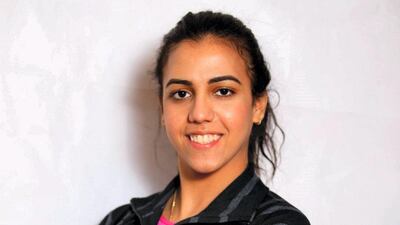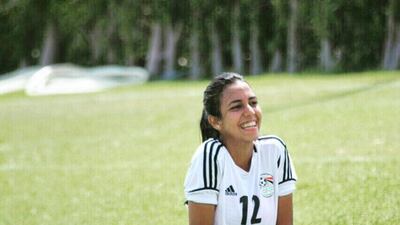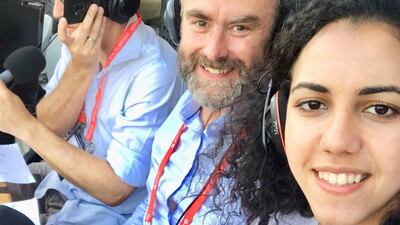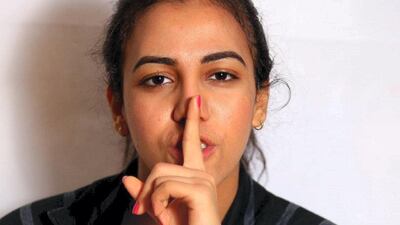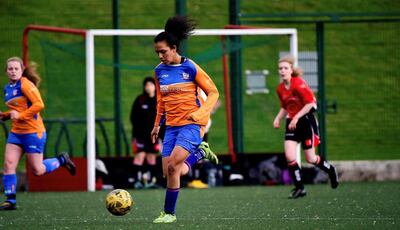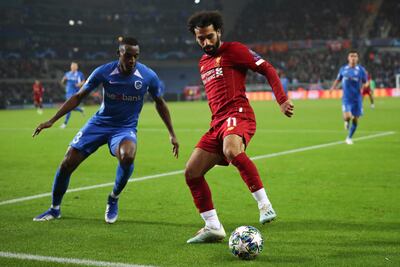At the age of six, Sarah Essam would stay up late to watch Uefa Champions League matches with her football-crazy brother. It was 2005, when Ronaldinho, Zinedine Zidane, Thierry Henry, Steven Gerrard and a young Cristiano Ronaldo ruled the pitch.
She was mesmerised. Football became not just a passion to her, but an obsession. The little girl from Egypt wanted to be out on the pitch herself, beating players, scoring goals. But even she couldn’t have imagined what would happen next.
Today, Essam is not just the first and only female Arab athlete playing professional football in Europe, but she also finished as the top scorer in the English Women’s National League with Stoke City last season.
"My happiest days were when my brother let me play with him and his friends," Essam, 20, tells The National. "They started recognising my talent, I started participating with my school's team and then I took it to another level."
Essam had proved adept at several sports by then, including volleyball, handball, cricket and basketball, for which she won awards. But she had only one true love. “The reason I stopped basketball was because I realised I would rather play the ball with my feet. It gives me an irreplaceable feeling.”
From the start, there were societal barriers for her to tear down, especially considering she was living in a country that, like in much of the world, is not used to the idea of women playing football. “Honestly, this is known as only a man’s game by many people,” Essam says. “It was taboo and all I knew was that I needed to do this to inspire others and reach my goals.
"Maybe because I had a strong character, but none of my friends dared to say to my face: 'why do you play football?' Or, 'you're a girl, you won't get anywhere'. But I could see it in their eyes and, even when they wished me good luck, I felt there was sarcasm in their words. Women in Egypt were not appreciated in this sport like they are in other countries around the world," she adds.
When she first started out, there was little funding in women’s football in Egypt and, despite countless hours sacrificed on the training ground, Essam began to believe she might have to leave her home country in order to realise her dreams of going pro.
The turning point came when she failed to make the squad for the 2016 Africa Women Cup of Nations, having been part of the youth set-up since she was 14 years old.
"Being dropped just one day before the start of the tournament – after I played two years for my country in the U17 World Cup qualifications, and then becoming one of the youngest players to be picked for the national team – was heartbreaking," Essam says. "My friends and coaches knew that it wasn't about my performances, but bias towards other players. I was depressed and about to give up. But something inside me told me to keep going. I don't know where I got this faith from. One of the best feelings in the world is proving the people who used to put you down, wrong."
It was then that Essam, with the support of her sister, Salma, made a decision that would change her life. She moved to England to study engineering – and seek out a career in football.
Quite literally, the siblings knocked on the doors of clubs asking for trials. Derby County was the first to show interest, but Essam’s gut led her elsewhere. “At the last minute, I changed my mind and signed with Stoke City, because, believe it or not, there’s chemistry in football, too,” she says. “Logistically, it was challenging as my university is in Derby, but I wanted to take on this challenge because I liked the style of playing and knew I could achieve things with this team.”
Despite the change in culture, diet and weather, Essam still came up against plenty of challenges. They were different to those she faced in her homeland, but still the pitch in Britain was not always a welcoming environment.
"It was so difficult at the beginning, maybe because some of the teams I played against didn't have any Egyptians or Arabs. I'd explain that we don't actually ride camels to work or walk like pharaohs," she says with laugh. "But I started to show my character more, worked harder and fit into the team because success comes from communication and teamwork. We had to understand each other to work better together."
Essam's success also took on another level of significance. "I'm always so proud to represent Egyptian women's football in the UK and [to pave a path] for the next young female athletes in Egypt." She's done exactly that. Last year, Essam won the Arab Woman of The Year: Achievement in Sport award from the London Arabia Foundation. She also won the Golden Boot for scoring 12 goals in 12 matches, as well as two Player of the Match awards, earning her the unofficial nickname, the "next Mo Salah", after Egypt's greatest footballing export and Essam's favourite player.
With the new season underway, last year’s accolades are only the beginning. “I don’t want to feel that I’ve reached a target because everyone at home is celebrating this achievement,” she says. “It may seem like this in Egypt, but I see it as only a beginning for Sarah Essam, so I quickly cleared my head of interviews and social media a little. It’s a new season, I want to win things.”
Similar to the “Egyptian King”, as Liverpool fans refer to Salah, Essam is proud to be raising her country’s profile in Europe, while at the same time setting an example for others back home.
“I’m so honoured to be able to break a lot of barriers for other girls and I hear that a lot of academies have been set up in Egypt since I signed with Stoke. Not only that, but parents now understand their daughters can achieve their dreams in both education and sport, like I’m doing.
“There will be a bright future for Arab women footballers as long as they believe in themselves and set targets to prove everyone wrong.”
Recently, Essam was invited by the BBC to comment on matches during the 2019 Women’s World Cup in France, a role she would repeat with the men’s AFC Africa Cup of Nations in Egypt. “Deep inside, I was so hurt that our national team has not participated in any tournaments for two years,” she said at the time.
“It’s just a shame. I’ve achieved individual things, but playing for your country is something hard to describe.” There is still hope, however, that a strong Egyptian women’s team may be resurrected. If it is, there is no doubt Essam will be eagerly welcomed back.
“My ambition is to keep achieving new targets every year, never slowing down,” she says. “With Egypt, I’m dreaming of helping them do well in the Africa Cup of Nations [Congo 2020] and to qualify to the World Cup for the first time in our history.”
A six-year-old Essam would definitely approve.




